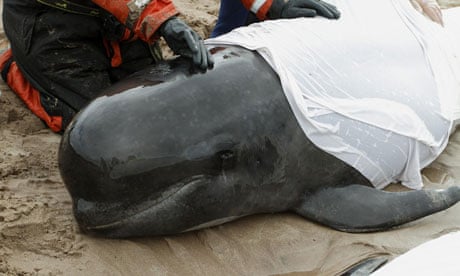Rescuers returned 44 pilot whales to open water yesterday after a mass stranding in the estuary of a sea loch in the Scottish Highlands. Twenty-five whales from the pod died at the Kyle of Durness when they beached at low tide.
Attempts to refloat the whales began on Friday night. British Divers Marine Life Rescue (BDMLR) medics, the coastguard and the Royal Navy managed to rotate whales that were upside down to prevent them from drowning when the tide came in.
BDMLR said many of the whales had stranded on their sides, on top of each other and upside down and were breathing in sand.
Nine sets of pontoons were delivered to the site, but were not used as the estuary flooded too quickly. The water receded yesterday, and several bodies were discovered on shore. Three whales were found alive, but were put down by vets because their condition was not suitable for refloating.
Post-mortem examinations to try to determine both the cause of the stranding and the deaths of the whales will now be carried out by pathologists, assisted by BDMLR medics.
Rescuers continued to search the coast, lochs and headlands yesterday for evidence of the other whales who, it was hoped, had returned to open water.
Pilot whales, which live in tight-knit social groups, prefer deep water but come inshore to feed on squid, their main food.
Mark Simmonds, the Whale and Dolphin Conservation Society's international head of science, said: "As they try to help each other, they may all come ashore." He said the situation in the Kyle of Durness was a "whale trap", a narrow body of water with many soft sandbank areas that may confound their echolocation abilities.
"Something may have startled the group further out to sea and they panicked, came into this unusual situation and were unable to find their way out."
Pilot whales are among the most intelligent of all marine mammals and have what is described as an altruistic nature, tending to remain with sick members.
"The stranding of one or two animals would possibly cause distress and the others in the group would try to assist the stranded individuals and themselves get into trouble," said Simmonds.
"Stranding on rocks will wound the whales quickly but even on a soft sandy shore it is still a race against time for experts to try to get them back into the water, and even then there may be a problem of persuading the group to go back into the open sea."
In May, about 60 pilot whales – which can grow up to 20ft long – appeared in Loch Carnan, South Uist. It is thought they may have lingered in the area because the animals were accompanying a dying female. They left the loch after one of the pod died of infection. Rescuers later found a second whale dead in the same loch, although it was thought to have floated in on the tide.
In October last year, 33 whales were found dead on a Donegal beach.

Comments (…)
Sign in or create your Guardian account to join the discussion